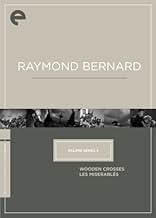IMDb रेटिंग
7.7/10
1.8 हज़ार
आपकी रेटिंग
अपनी भाषा में प्लॉट जोड़ेंWorld War 1 begins and a young man enlists to fight for his country.World War 1 begins and a young man enlists to fight for his country.World War 1 begins and a young man enlists to fight for his country.
Raymond Aimos
- Soldat Fouillard
- (as Aimos)
Antonin Artaud
- Soldat Vieublé
- (as Artaud A.)
René Bergeron
- Soldat Hamel
- (as Bergeron)
Raymond Cordy
- Soldat Vairon
- (as R. Cordy)
Marcel Delaître
- Sergent Berthier
- (as Delaitre)
Jean Galland
- Capitaine Cruchet
- (as Galland)
Pierre Labry
- Soldat Bouffioux, le cuistot
- (as Labry Pierre)
Geo Laby
- Soldat Belin
- (as Laby Géo)
René Montis
- Lieutenant Morache
- (as Montis)
Jean-François Martial
- Soldat Lemoine
- (as J.F. Martial)
Marc Valbel
- Maroux
- (as Valbel)
Christian-Jaque
- Un lieutenant
- (बिना क्रेडिट के)
कहानी
क्या आपको पता है
- ट्रिवियाHistorian Georges Sadoul relates that the impression made by this memory of WWI was so powerful that one of the original combatants, seeing it on French TV in 1962,almost fifty years after the war, was disturbed enough to take his own life.
- इसके अलावा अन्य वर्जनThere is an Italian edition of this film on DVD, distributed by DNA Srl: "LE CROCI DI LEGNO (1932) + PER LA PATRIA (J'Accuse, 1919)" (2 Films on a single DVD). The film has been re-edited with the contribution of film historian Riccardo Cusin. This version is also available for streaming on some platforms.
- कनेक्शनEdited into The Road to Glory (1936)
- साउंडट्रैकAve Maria
Written by Franz Schubert
फीचर्ड रिव्यू
The precedent user wrote that he saw old men crying while watching this film.Such is the strength of these pictures.Raymond Bernard's movie compares favorably with "All quiet on the western front" (Lewis Milestone)"Westfront 1918" (Pabst) or even more recent works such as "paths of glory" .
Bernard 's approach (transferring a best-seller for the screen) was almost documentary.We know almost nothing about the three leads.The intermixing of the social classes (there is a baker,a worker and a law student)was not,as it has often been mooted,the main subject -as it was in Renoir's "la grande illusion" - of "les croix de bois" .Its purpose is,as the precedent user wrote,to show that horror is timeless.
"If you do not get the military Cross ,you'll get the wooden cross " the soldiers sing.The prologue tells it all: ranks of soldiers become ranks of crosses.In "J'accuse"(Abel gance,1938),a soldier says that pretty soon there will not be enough wood to make crosses for the graveyards.
Admirable sequences:
-A soldier is singing a peaceful "Ave Maria" in a church but a terrifying camera movement reveals an improvised hospital with disabled soldiers .
-A dead soldier has received a letter.One of his mates lays it down on his grave with a rose.
-The central battle scene which lasts about 15 minutes.On the screen ,a line appears "it lasted ten days" ,then another one "ten days" ,then in large characters "TEN DAYS".
-The soldiers taking refuge in a graveyard (!) where one of them (Charles Vanel) is dying, cursing again and again his unfaithful wife,then breathing his forgiveness.
-The student's death ,with death rattles and cries of terror all around him (I want my mum!I do not wanna die!).The ending does not use any music,which was rare at the time, and it increases tenfold strength and emotion.
After watching this movie on TV,in 1962, a WW1 old campaigner committed suicide.It speaks volumes about the strength of these pictures.
Bernard 's approach (transferring a best-seller for the screen) was almost documentary.We know almost nothing about the three leads.The intermixing of the social classes (there is a baker,a worker and a law student)was not,as it has often been mooted,the main subject -as it was in Renoir's "la grande illusion" - of "les croix de bois" .Its purpose is,as the precedent user wrote,to show that horror is timeless.
"If you do not get the military Cross ,you'll get the wooden cross " the soldiers sing.The prologue tells it all: ranks of soldiers become ranks of crosses.In "J'accuse"(Abel gance,1938),a soldier says that pretty soon there will not be enough wood to make crosses for the graveyards.
Admirable sequences:
-A soldier is singing a peaceful "Ave Maria" in a church but a terrifying camera movement reveals an improvised hospital with disabled soldiers .
-A dead soldier has received a letter.One of his mates lays it down on his grave with a rose.
-The central battle scene which lasts about 15 minutes.On the screen ,a line appears "it lasted ten days" ,then another one "ten days" ,then in large characters "TEN DAYS".
-The soldiers taking refuge in a graveyard (!) where one of them (Charles Vanel) is dying, cursing again and again his unfaithful wife,then breathing his forgiveness.
-The student's death ,with death rattles and cries of terror all around him (I want my mum!I do not wanna die!).The ending does not use any music,which was rare at the time, and it increases tenfold strength and emotion.
After watching this movie on TV,in 1962, a WW1 old campaigner committed suicide.It speaks volumes about the strength of these pictures.
- dbdumonteil
- 27 जुल॰ 2005
- परमालिंक
टॉप पसंद
रेटिंग देने के लिए साइन-इन करें और वैयक्तिकृत सुझावों के लिए वॉचलिस्ट करें
- How long is Wooden Crosses?Alexa द्वारा संचालित
विवरण
- चलने की अवधि1 घंटा 55 मिनट
- रंग
- पक्ष अनुपात
- 1.37 : 1
इस पेज में योगदान दें
किसी बदलाव का सुझाव दें या अनुपलब्ध कॉन्टेंट जोड़ें
































